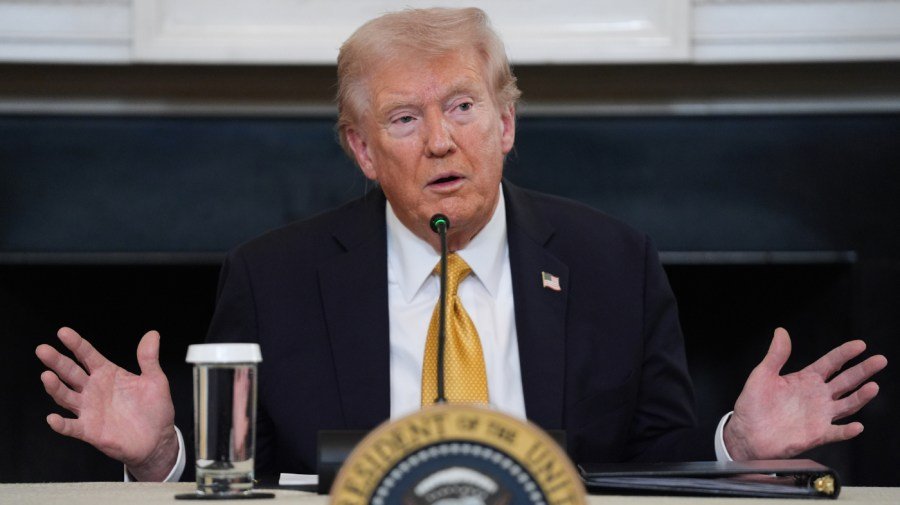
What possibly could go wrong? Congress refuses to consider negotiating a compromise on reopening the government.
Whenever I come across National Guardsmen or other uniformed federal law enforcement officers patrolling the streets of Washington, D.C., I engage in polite conversation gently asking what their real role is; what would happen if they saw a major crime being committed; thanking them for their service; and asking how or if they are managing without being paid by Uncle Sam’s sequestration. Responses not provided.
The ceasefire in Gaza is dangling by a thread. Vladimir Putin has cancelled talks on the war in Ukraine. Irreconcilable differences over a Ukrainian peace agreement have relegated the once highly advertised great Budapest summit to where it should have been in the first place: a garbage compactor. Ukraine will not get Tomahawk missiles — a great shame, as they are needed to threaten vulnerable energy infrastructure and drone factories deep inside Russia to force Putin to come to the negotiating table.
Yet, despite imposing new sanctions on Russia, Trump seems to believe a peace deal could be reached or has not forgone complete hope. Trump’s optimism is commendable — his sense of realism may not be. Leveraging his best friend “Vlad” is not that easy. And Russia continues to erode Ukrainian power generation and transmission infrastructure and impose civilian casualties with drone and missile attacks.
When China threatened a cutoff of rare earth elements crucial to high and low technology items the U.S. desperately needs, Trump may have backed down a bit on tariffs.
However, the deal he signed with Australia on rare earth elements has great potential, once the infrastructure for mining and production is in place. That is unlikely to occur overnight. Still, Trump’s meeting with China’s president and close friend Xi Jinping, if it occurs, may produce some policy coherence.
Trump has declared an undeclared war on Venezuela and its president, Nicolas Maduro, suggesting the intent for regime change — something in which the U.S. has hardly excelled since the end of World War II. Air strikes to sink alleged drug runners have now reached the eastern part of the Pacific. The reality is that the real pipelines run north from Colombia to Mexico.
So, is Trump going to start another version of the 1846-48 U.S. war with Mexico, landing Marines at Vera Cruz or Tijuana? And has he, by ending trade talks with our Canadian friends for the second time in U.S. history, now established two adversaries on our northern and southern borders?
American Firsters and MAGAites are perplexed and even furious that, while bankrupting farmers, Trump is sending $40 billion in rescue money to Argentina. And he is suggesting the importation of delicious Argentine beef to lower costs in the U.S. That has not gone down well with ranchers, who by and large are Trump supporters.
The other day, I lunched with a highly respected former U.S. senator, who had to admit that Republicans in the House and Senate are absent with leave, abdicating their responsibilities at Trump’s insistence.
Who is standing up to Trump? His economic policies are incoherent. To most objective observers, his attacks on Venezuelan drug boats using the military is clearly a violation of the Posse Comitatus Act, the 1878 law that prohibits the military serving law enforcement purposes. And does it not make better sense to take these drug runners alive in the expectation that some intelligence would be forthcoming?
The Dow Jones and Standard and Poor’s indices continue to reach stratospheric numbers, raising the prospectof all sorts of potential bubbles that may or may not burst.
Come Nov. 1, assuming the government remains closed, new and much higher insurance rates for tens of millions of Americans will be published for next year. So many people are already living from paycheck to paycheck and unable to cover an unexpected $500 expense.
The metaphor that applies perhaps is the man who, having just leapt off the Empire State building’s observation platform, was asked when flashing by the 52nd floor how things were going. His response was, “So far, so good.” Are we in a similar position now?
Harlan Ullman, Ph.D., is UPI’s Arnaud deBorchgrave Distinguished Columnist, a senior advisor at the Atlantic Council, the chairman of two private companies and the principal author of the doctrine of shock and awe. He and former United Kingdom Defense Chief David Richards are the authors of a forthcoming book on preventing strategic catastrophe.


